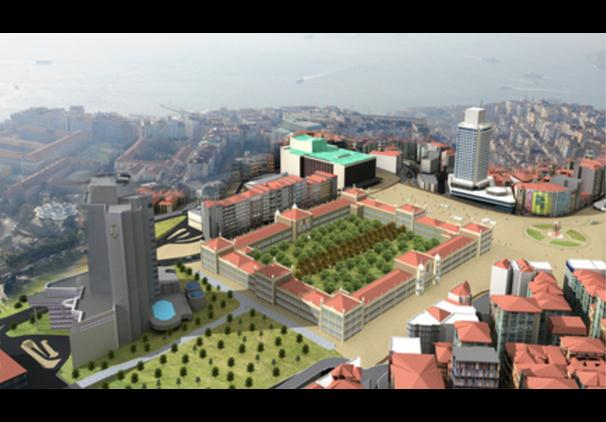Istanbul: Local Gezi Park Goes Global

What began as a protest to reclaim public space in Istanbul’s city center, rippled into massive protests across the country in response to the onward private development of public space. On 27 May, approximately 70 Right to the City protesters gathered in Taksim Square, as an effort to halt the destruction of adjacent Gezi Park, one of the few remaining public spaces and gardens in Istanbul. The redevelopment of Taksim Square, a central gathering place of Turkey’s largest city, reassign the space into a “more car-friendly, tourist-accommodating, and sanitized urban center.”
During the early phases of the Gezi Park protests in Turkey, Prime Minister Recep Tayyip Erdoğan stated If Taksim Square is not evacuated, this country`s security forces will know how to evacuate it. This was met with police forces entering the square with water cannons, tear gas and other brutal crowd control tactics. However the crowd did not disperse, but rather continued to grow with parallel protests emerging in cities across the country. By 31 May, in response to the violent and harsh response from the police, the numbers of protesters swelled to an estimated 5,000–10,000 in the city center.
HIC Members and affiliates involved in the popular movement have included local activists and professionals. HIC-HLRN has accompanied Urban Movement Istanbul and People’s Houses through the waves of protest and repression and, in particular, the Union of Chambers of Turkish Engineers and Architects (TMMOB) through its contestation of government imposed plans and the AKP-led parliament’s retaliation against them.
Turkey has always positioned itself as a stable and democratic country in an otherwise tumultuous geopolitical landscape, a “brand” that the government led by the Justice and Development Party (AKP) has been nurturing and promoting to the outside world, while maintaining a neoliberal high-security nation state in which most actions can be justified in the name of “stability.”
Through an increasing crackdown on society including media and journalists, labor rights and even moral behavior, the people of Turkey have accumulated a long list of grievances against the current government. While protesters have taken it to the streets for various reasons, the spontaneous social movement has created a dynamic in which the notions of democracy, progress and the neoliberal order can be questioned and popularly defined.
The political culture of modern-day Turkey is rooted in secularism; however, Turkey’s politics have taken an increasingly conservative and Islamist path over the past several years, coupled with a rising trend toward capitalist-dominated, neoliberal economic policies guiding the country’s politics. This change has occurred with the increasing power of both AKP President Abdullah Gül and Prime Minister Erdoğan.
As seen in the pages of Land Times,this trend of popular response and resistance is not unique to Turkey, as the movements that rippled across the MENA region during the “Arab Spring” demonstrated since early 2011. These countries have also seen much popular resistance to similar urban renewal plans, such as Cairo’s 2050 plan and Beirut’s Solidere. Resistance to these models of highly privatized development priorities have even reverberated globally. They have drawn comparison to the Occupy Wall Street movement and coincided with the resistance across Brazil to the disproportionate spending on urban “development” for the upcoming World Cup and summer Olympics. By analogy, a movement of Istanbulites formally have urged the International Olympic Committee to deny their city’s 2020 Olympics bid.
A new, popular and more-questioning ideology has been embodied in urban resistance movements across the globe, but has assumed particular form within the MENA region. With concepts articulated in claim of a Right to the City, resisters increasingly understand the city as a “culturally rich and diversified collective space that pertains to all of its inhabitants,” which includes social justice and access to all human rights. A primary component to this ideology is the social function of the city, which promulgates the notion that “the city must assume the realization of projects and investments to the benefit of the urban community as a whole, within criteria of distributive equity, economic complementarity, respect for culture, and ecological sustainability, to guarantee the well-being of all its inhabitants.” This more social orientation to progress poses that “the formulation and implementation of public policies should promote socially just and environmentally balanced uses of urban space.” Essentially, the right to the city is the marriage of the governance of space and of people in order to maximize access to human rights and social justice in urban spaces.
In Turkey, the Right to the City has become a conceptual rallying point behind the Gezi Park and other recent protests, and has spread to question other government-imposed urban development projects. The Right to the City concept has allowed for a non-aligned movement to develop in Turkey. No single political party has been backing the protests. Public forums have been held in some 30 parks across Istanbul, as well as in other cities including Ankara, İzmir, Adana, Mersin, and Eskişehir, in order to continue debate and discussion, and further the resistance by maintaining the “Gezi Spirit.” Plans are being made to create concrete practices such as neighborhood workshops and identifying communication strategies to counter government propaganda.
What remains to be witnessed is how this process will continue to unfold, as it is far from over. The “Gezi Spirit” will continue to be the means through which Turkish citizens reassert their rights and grievances against government abuse, the world will be watching as the AKP decides whether to continue on its current path of suppressing the popular outcry, or if it reforms toward a productive discourse that would foster actual transparent democracy in response to popular will.
Thus, the Gezi Park movement represents more than saving a park in Turkey. It represents the fight for increasing desire or urbanites across the globe for public space and community-based development planning, and even more so against the global neoliberal agenda.
|